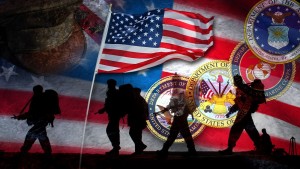I’ve written before about my favorite veteran.
He was my late father, Peter John Kanelis, a proud veteran of the U.S. Navy who survived the horrifying crucible of World War II.
I wrote the first time about his service two years ago.
Dad saw the bulk of his combat in the Mediterranean Sea, engaging in the invasions of North Africa, Sicily and Italy. He endured relentless bombing and strafing by the Luftwaffe, had the ship on which he served sunk by an Italian dive bomber, and was credited with shooting down a Juncker JU-88 German bomber while manning a .50-caliber deck gun during the Sicilian campaign.
He told me of a time he was standing guard while on shore patrol in Tunisia and he shot to death someone who had breached his unit’s perimeter. Was it an enemy soldier? No, Dad said. It was a local guy who was in the wrong place at the wrong time.
Dad was like almost all World War II vets in this regard: He didn’t volunteer much about his experiences during that war. Oh, he’d talk about it if someone asked. And yes, I asked him about those days. We talked often while I was growing up.
I learned about how he joined the Navy just a few weeks after the attack on Pearl Harbor, how he went through an abbreviated boot camp in San Diego as the U.S. War Department sought to get mobilized in a hurry and how he learned his seamanship skills aboard ship while steaming to Great Britain.
Mom would tell me that Dad suffered for a time upon his return from the war from a form of shell shock — which they now call “post-traumatic stress disorder.”
It would manifest itself, Mom said, when Dad would hear the sound of an airplane. He’d flinch and look up, she said. All that constant bombardment made Dad quite jumpy when he heard the sound of aircraft overhead.
He got past that period of his life.
He intended to be join the Marine Corps the day he enlisted. As luck would have it, the USMC office was closed that day; he walked across the hall and joined the Navy. I believe he would have made as good a Marine as he was a sailor.
But to be honest, I’m grateful Dad was spared the task of potentially having to storm ashore amid a hail of enemy bullets.
His Navy duty was rough enough.
Dad’s been gone for 35 years. This much hasn’t dimmed one single bit as the nation prepares to commemorate Veterans Day: I’m as proud of my father’s service to his country now as I was when I first learned about it.
